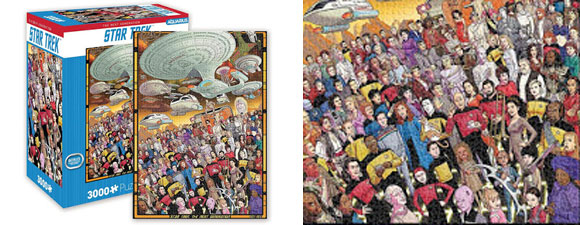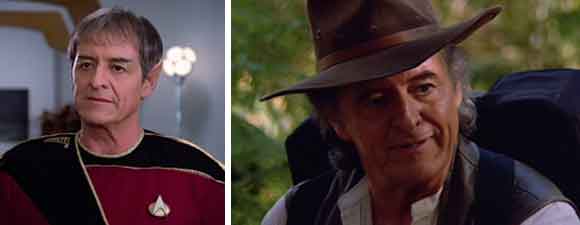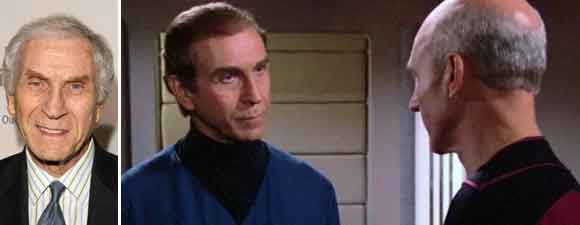Retro Review: Firstborn
6 min readA Klingon family member with a mysterious past comes to the Enterprise to teach Alexander how to be a warrior.
Plot Summary: Though Worf is eager to begin Alexander’s training for the first Rite of Ascension, Alexander announces that he has no wish to become a Klingon warrior. Distressed, Worf confides in Picard, who suggests that Worf take Alexander to the Kot’baval festival where Alexander will enjoy Klingon theatrics and celebrations of his heritage. Alexander does appreciate the mock battles and songs, but when Worf is nearly killed by a group of assassins, he hides and watches as a Klingon named K’mtar comes to his father’s rescue. K’mtar introduces himself as a friend of the House of Mogh who has been sent to protect Worf from such an attack after threats were made on Qo’noS. A dagger dropped by the assassins bears the crest of Worf’s longtime enemy, the House of Duras. K’mtar expresses concern that Alexander is being raised so far from other Klingons and offers to help train Alexander, who agrees out of a desire to protect his father from future threats. But Alexander is reluctant to kill even holographic opponents, and K’mtar tells Worf that he believes Alexander should be sent away to a Klingon academy for proper education. Troi tells Worf not to neglect Alexander’s human heritage, but K’mtar indicates that he may seek custody of Alexander if Worf refuses to train the boy. Since Picard is away on an archaeological expedition, Riker takes the Enterprise in pursuit of the Duras sisters and finds them in the midst of an illegal mining transaction. When Worf accuses them of trying to kill him with the dagger, they examine the crest and point out that it must be a forgery because one of the markings indicates a Duras heir who has not yet been born. When Worf goes to question K’mtar, he finds the other Klingon pointing a phaser at the sleeping Alexander. Worf nearly kills K’mtar, but K’mtar explains that he is Worf’s son – in fact, he is Alexander from the future, in which he became a diplomat and was unable to protect Worf from a later assassination attempt because he never trained as a warrior. Now that he knows he never will, the adult Alexander wishes to kill his younger self and spare himself later pain. Worf insists that he is proud of Alexander and believes his own death will be honorable if he helps his son achieve his goals, whether or not they include becoming a warrior. After K’mtar leaves, Worf finds Alexander training on the holodeck and suggests that they do something Alexander would prefer.
Analysis: I had recalled “Firstborn” as a wimpy Klingon rip-off of “Yesteryear,” the terrific episode of Star Trek: The Animated Series in which Spock goes back in time and saves himself as a child during a coming-of-age ritual that cements his loyalties as a Vulcan, though in Alexander’s case obviously the choice of allegiance has been reversed. I can’t help but draw comparisons not only to the more contemporary comic story Back to the Future as well as to Deep Space Nine‘s superlative “The Visitor,” in which a future Jake Sisko gives up his life to save his father. Yet “Firstborn” has its own charms – a Klingon festival that’s much more lighthearted and celebratory than the rituals with pain sticks that we’ve observed so far, a glimpse at what the Duras sisters are up to while trying to raise the cash to take over the universe, a look at Worf’s evolved relationships with Picard, Riker, and Troi, and the only moment between Worf and Alexander all series that I’d describe as really sweet, though there’s also something quite sad about the fact that Alexander has to teach his father how to be a father.
The Kot’baval festival may have singlehandedly redeemed Klingon culture for me. Thus far it’s been all about warriors inspiring other warriors, testing each other’s strength, singing martial tunes, all performed in deadly earnest…and we still haven’t received a clear explanation for how Worf experienced all this, considering that he was raised by humans on Earth and had to be taught by renegade Klingons how the mourning rituals worked. He was 15 when he underwent the first Right of Ascension, which is quite a bit older than Alexander at the time of “Firstborn,” but I assume he must have had some training in addition to playing sports with human children. I’m rather uncomfortable with the explanation that both Worf and K’mtar give Alexander about why he should dedicate himself to the Klingon way – that no matter how human he may feel, others will always see him as a Klingon. Is racial bias still so strong in the 23rd century, even among friends and allies? More humans should attend the Kot’baval festival! It’s delightful to know that the Klingons have the equivalent of Renaissance Faires, and that there’s street opera celebrating the deeds of Kahless as well as all the formal rituals. Alexander may not want to be a warrior but he sure looks like he’s having fun, waving a bat’leth at a Klingon twice his size, and while the traitor Molor might have attacked a child, the actor playing him has enough honor to let Alexander win.
I’m not sure why K’mtar doesn’t play up that aspect of Klingon heritage and tell both Alexander and Worf that that’s what studying will be like if Alexander goes to the Klingon school on Ogat. The adult Alexander doesn’t seem to consider that if his father hadn’t raised him, he wouldn’t feel the same attachment that compelled him to travel back through time to try to save Worf’s life far in the future, and how odd that he buys more fully into the system that will cost him both his parents, rather than wanting to find a way to distance his father from the treachery and brutality on the homeworld. Worf expects his son both to fit in with human children and to feel like a Klingon as Worf defines it. Worf accepts the Klingon sexism that K’Ehleyr rejected, saying that Alexander may have to lead the House of Mogh since Kurn has only daughters, though we’ve seen from the House of Duras and others that one may feel like a true Klingon while interpreting tradition rather differently. Worf’s life among humans seems to have made him more rigid rather than less so, even though he’s had to accept disgrace to his Klingon family name and even though Gowron has used him shamelessly. It makes perfect sense to me that he doesn’t want to send his son away, and I’d probably like the episode better if that, rather than the attempted murder-suicide, were what triggered the epiphany to make him stop trying to force Alexander into Worf’s own mold.
I’m also ambivalent about the time-travel trick, in particular because we don’t get any explanation whatsoever of how it works. Even 30 years on, I can’t believe there are many aliens walking around selling no-questions-asked trips to the past. K’mtar may not want to be a warrior, but it would be nice if he had some basic training in temporal causality, considering that the abrupt death of a son to whom he is attached would undoubtedly be a far greater horror to Worf than the prospect of assassination by a fellow Klingon far in the future. (Let’s not even get into the what-happens-if-you-go-back-in-time-and-shoot-yourself conundrum – do you disappear in the present since you died in the past, or, as in “Yesteryear,” do you continue to exist in your own timeline but nobody knows who you are?) The idea that Alexander thinks it would be a better idea to murder himself as a child than to kill himself as an adult, which we’ve been told that Klingons can do with honor, seems much more cowardly to me than his youthful decision not to become a warrior, which, given that he’s K’ehleyr’s son, makes quite a bit of sense. And framing the Duras family, including a member not even born yet, seems pretty pathetic, too. Since we know now that Worf ends up a diplomat and ambassador, I’d say his son has a lot to learn before he follows in the footsteps of both parents to pursue the path of peace, whether or not he ever becomes a warrior.






